JICA Ogata Research Institute and UNDP Seminar Takes on Violent Extremism in Africa
2023.11.01
On Aug. 24, the JICA Ogata Sadako Research Institute for Peace and Development (JICA Ogata Research Institute), together with the United Nations Development Programme (UNDP), organized a pivotal seminar addressing the rise of violent extremism in African regions.
Entitled “Options for Stabilization and Prevention in African Regions Affected by Violent Extremism,” the event aimed to draw on research findings from a series of UNDP's studies on prevention of violent extremism (PVE) and to foster dialogue among policymakers and practitioners. The seminar was held both virtually and at the Iwasaki Koyata Memorial Hall, International House of Japan, in Tokyo.
The seminar comes amid an escalating threat of violent extremism in Africa, with a tenfold increase in attacks in the Sahel region since 2007. Despite substantial international efforts, violent extremism has expanded, not retreated, making Africa a new epicenter of violent extremism. The event aimed to promote preventive, evidence-based, and development-oriented interventions to counter this trend, with an emphasis on rethinking the dominant securitized discourses and responses.
In her opening remarks, Ahunna Eziakonwa, UNDP’s assistant administrator and regional director for Africa, highlighted the importance of development-focused interventions to tackle violent extremism, citing examples of UNDP's work with partners such as Japan. While praising Japan's leadership through the Tokyo International Conference on African Development (TICAD) in addressing African peace issues, she stressed that research shows disproportionately low spending on activities to prevent extremism compared with military responses.
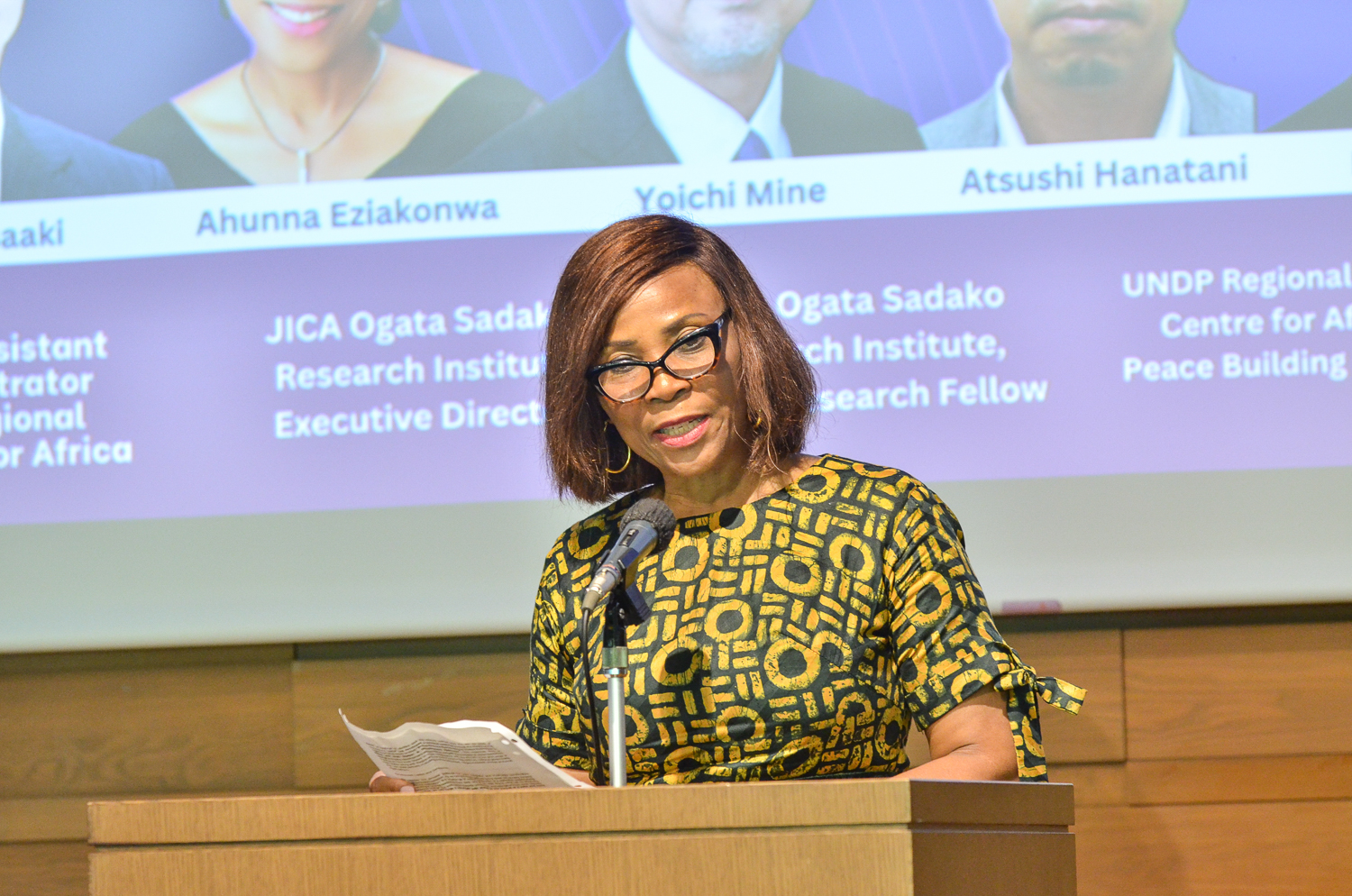
Ahunna Eziakonwa, UNDP's assistant administrator and regional director for Africa, highlighted the importance of development-focused interventions to tackle violent extremism.
Mine Yoichi, executive director of the JICA Ogata Research Institute, emphasized the importance of understanding local contexts and achieving inclusive development for effective prevention of violent extremism. Mine discussed the institute’s focus on human security perspectives pioneered by former JICA President Ogata Sadako and the economist Amartya Sen. From the human security perspective, ex-post assistance to refugees is important, but not enough, he said. Prevention is crucial. He described past and upcoming research projects examining issues such as people’s resilience and prevention of violent extremism, and people’s mobility and human security in Africa. Mine expressed confidence that the seminar would facilitate valuable learning between UNDP and JICA, given their complementary research approaches to advancing human security objectives.
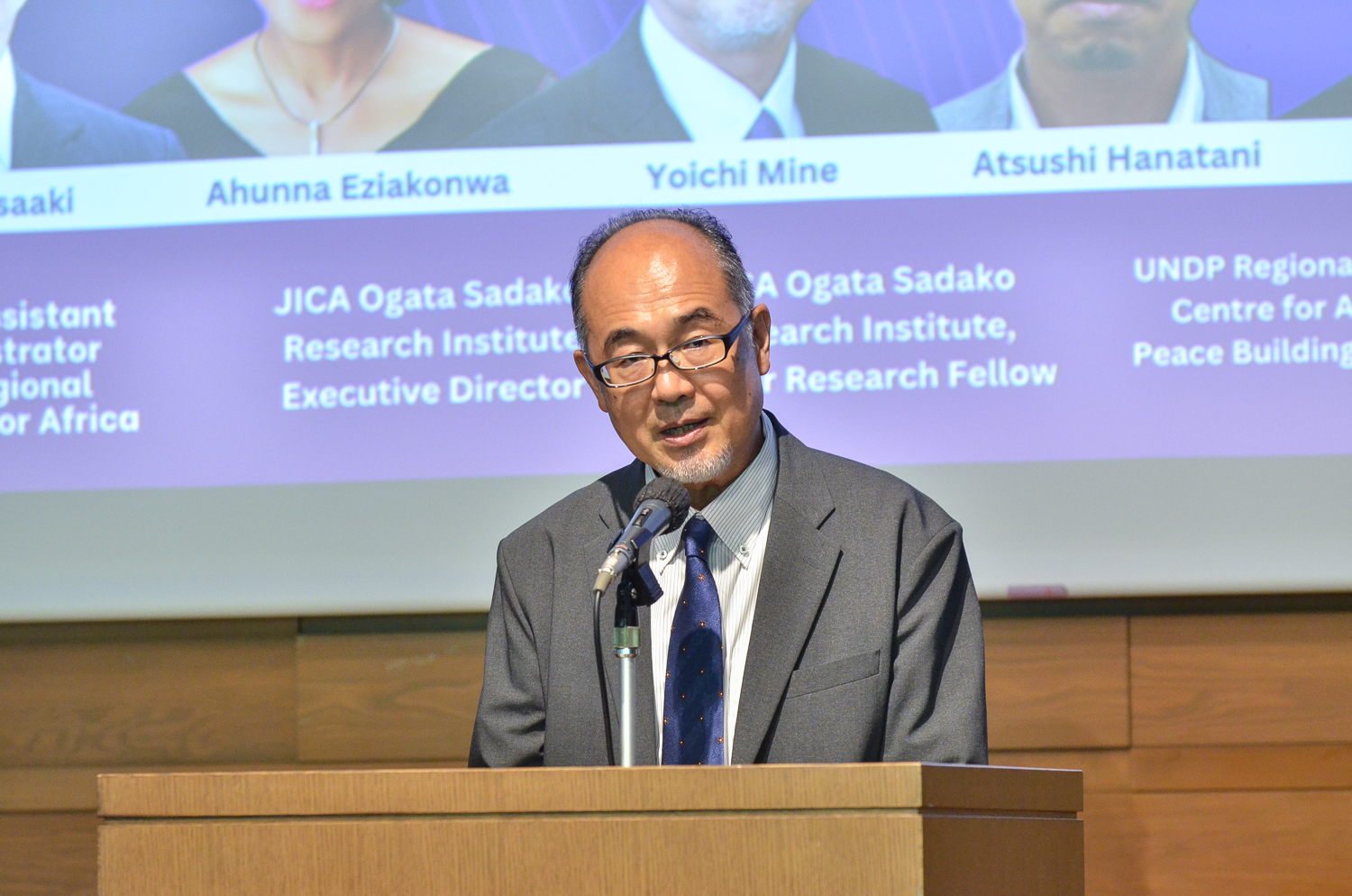
Mine Yoichi, executive director of the JICA Ogata Research Institute, emphasized the importance of local contexts and inclusive development for effective prevention of violent extremism.
Following Mine’s remarks, Taniai Masaaki, a member of the House of Councilors in the Diet, shared Japan’s assistance for PVE in Africa, emphasizing the need to support Africa-led efforts for peace.
Next, the seminar featured two presentations that provided insights into research outcomes. Nirina Kiplagat, peacebuilding advisor at the UNDP Regional Service Centre for Africa, and Giordano Segneri, governance and peacebuilding coordinator at the UNDP Regional Hub for Arab States, outlined findings and policy recommendations from UNDP’s studies. They joined the seminar remotely.
In her presentation on UNDP’s “Journey to Extremism in Africa: Pathways to Recruitment and Disengagement” and “Dynamics of Violent Extremism in Africa: Conflict Ecosystems, Political Ecology and the Spread of the Proto-State” reports, Kiplagat outlined key findings on the pathways and drivers of recruitment to violent extremist groups as well as triggers for disengagement. She highlighted that the most common reason cited for joining was lack of employment opportunities. While religious ideology was a factor, many recruits had little religious understanding. Triggers for disengagement include disappointment with monetary rewards from extremist groups, disillusionment with groups’ ideology, government incentives and amnesty programs. The presentation provided insights into individual radicalization processes to help rethink preventative development solutions.
Segneri’s presentation discussed several key policy implications of the reports. He emphasized the need to address grievances related to human rights abuses by security forces through strengthened accountability. He also highlighted the importance of reimagining social contracts from the bottom-up to enhance civic participation and build trust between states and societies. He further stressed the necessity of conflict-sensitive, localized, and long-term peacebuilding approaches centered on human security to develop sustainable solutions beyond short-term security measures.
“As the world faces the sharpest drop in human development threatening decades of hard-won development gains, we need to invest in hope, not only standalone security measures. And hope means from job to justice,” Segneri said.
The presentations were followed by a panel discussion moderated by Kondo Tetsuo, former director, UNDP Representation Office in Tokyo.
In the discussion, Hanatani Atsushi, senior research fellow at the JICA Ogata Research Institute, introduced a 2016 study of JICA that interviewed former extremists in Mali as a similar undertaking to UNDP’s report. It found unemployment and religion were only partial motivators for joining groups, but protection from threats was the primary driver in the absence of government protection and services. Hanatani noted JICA’s current Sahel strategies aim to fill such governance gaps and expand opportunities through initiatives in governance, security, health and infrastructure. However, operating in sparsely populated borderlands poses challenges with limited resources and mobility, he said. He further outlined three research projects as JICA’s academic contributions to PVE: examining community resilience and peacebuilding to prevent extremism from non-state armed groups; applying a human security lens to transboundary African migration; and operational research on youth empowerment in the Sahel.
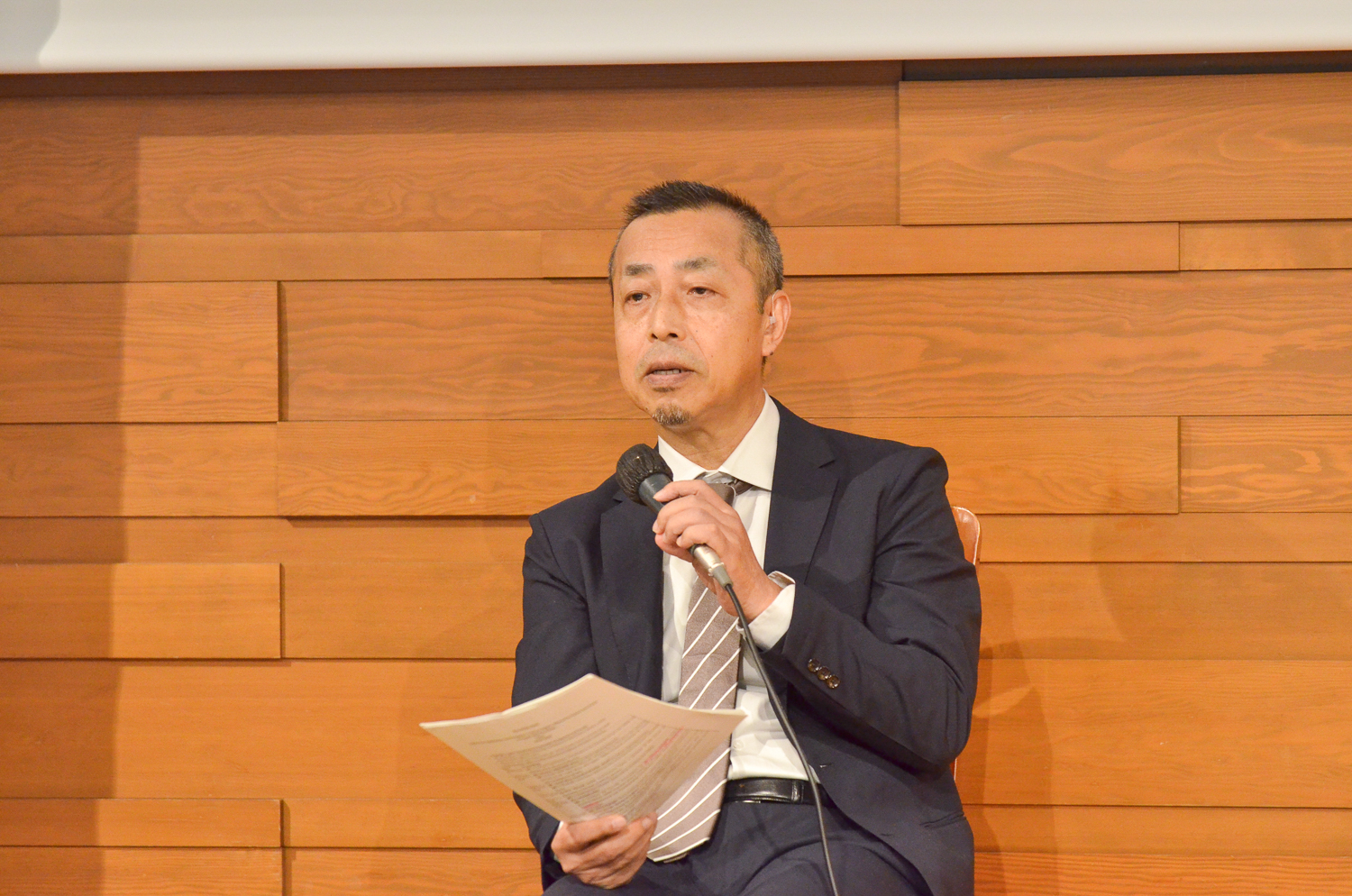
Hanatani Atsushi, senior research fellow at the JICA Ogata Research Institute, discussed a 2016 study in Mali that interviewed former extremists.
Nagai Yosuke, CEO of Accept International, discussed lessons learned from reintegrating youth between ages 18-35 associated with armed groups in Somalia, Yemen and other areas. He pointed out that defection from violent extremist groups is extremely difficult because if they know their members are leaving, they will kill them. He emphasized the need to address protection, support and justice to facilitate disengagement, and to better empower and engage youth.
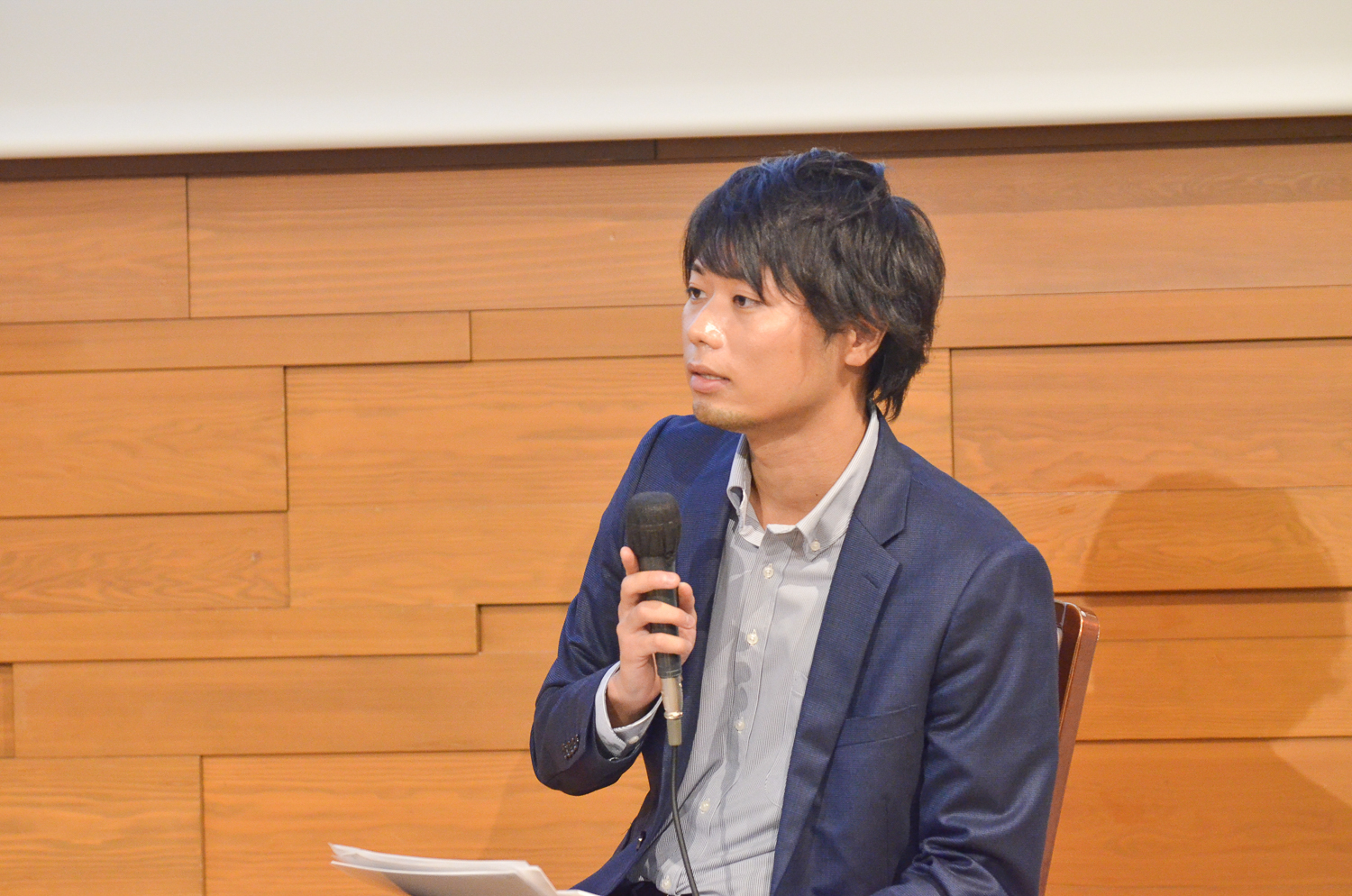
Nagai Yosuke, CEO of Accept International, discussed lessons from reintegrating youth associated with armed groups in Somalia, Yemen and other areas.
Fatima Akilu discussed her Neem Foundation’s work in Nigeria’s Lake Chad region through education programs which have helped reintegrating more than 5,000 children associated with violent extremist groups into public schools. Through a “Counseling on Wheels” program, the foundation has also treated 25,000 Nigerians who have suffered trauma. She stressed that trauma affects people’s ability to benefit from interventions, so trauma treatment is important for people to function and build resilience within communities, which could open space for peacebuilding and reconciliation.
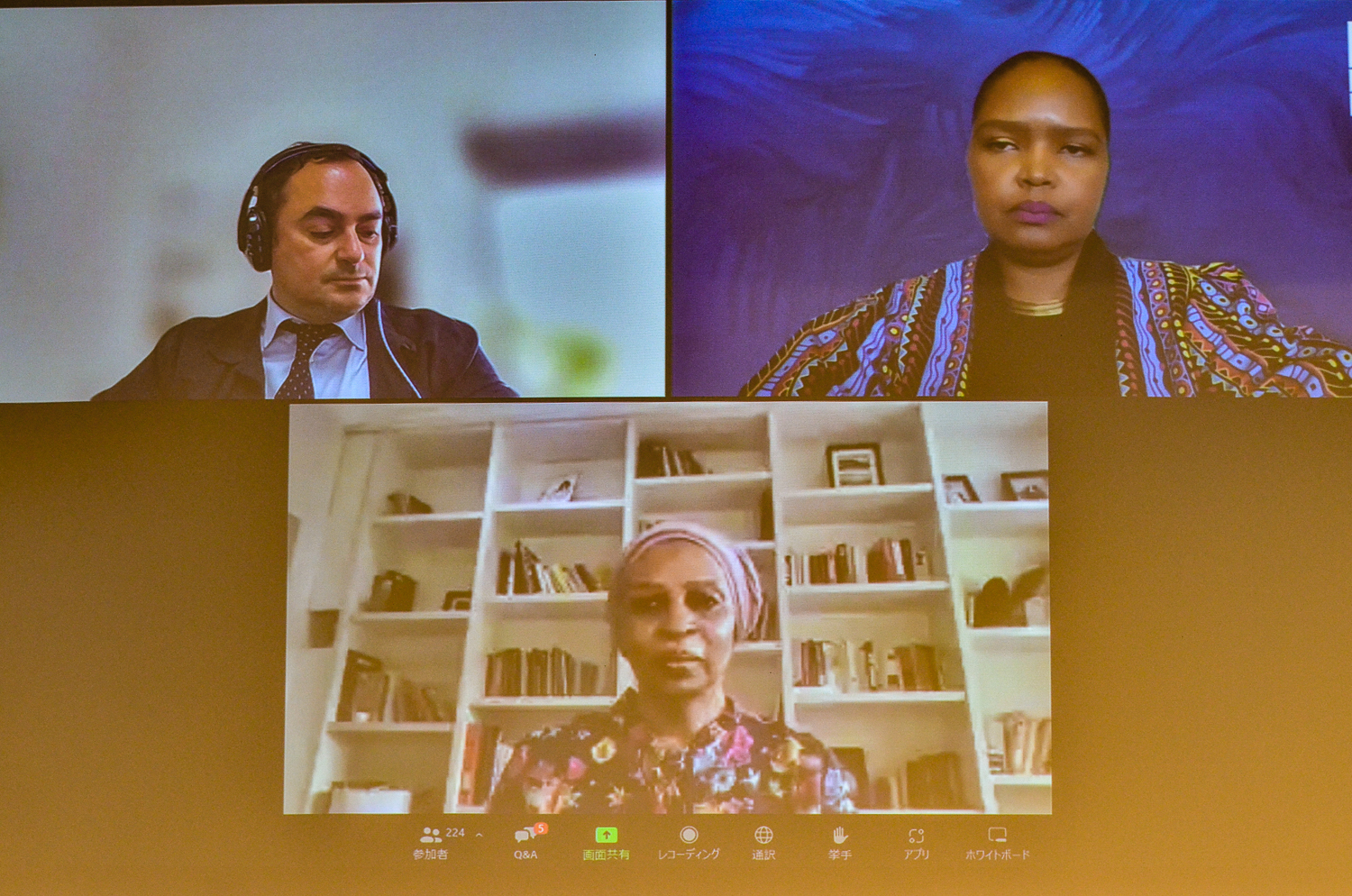
Clockwise from left: Giordano Segneri, governance and peacebuilding coordinator at the UNDP Regional Hub for Arab States; Nirina Kiplagat, peacebuilding advisor at the UNDP Regional Service Centre for Africa; and Fatima Akilu, founder and executive director of the Neem Foundation
The event ended with closing remarks from Mine and Eziakonwa.
Mine highlighted that extremism arises in sparsely populated border areas where governance tends to be weak, and called for regional frameworks and development projects in such areas to better address human insecurities in volatile peripheral regions. This reflects the challenges posed by extremism and the strong need for global, coordinated responses.
Eziakonwa emphasized that violent extremism is a global issue requiring multilateral solutions and collective action. She highlighted the geopolitical dimensions at play in the Sahel region’s vulnerability to extremism, and advocated for strengthened governance at all levels including an increased focus on borderlands, which have been historically marginalized and excluded from central-level investments.

事業事前評価表(地球規模課題対応国際科学技術協力(SATREPS)).国際協力機構 地球環境部 . 防災第一チーム. 1.案件名.国 名: フィリピン共和国.

事業事前評価表(地球規模課題対応国際科学技術協力(SATREPS)).国際協力機構 地球環境部 . 防災第一チーム. 1.案件名.国 名: フィリピン共和国.

事業事前評価表(地球規模課題対応国際科学技術協力(SATREPS)).国際協力機構 地球環境部 . 防災第一チーム. 1.案件名.国 名: フィリピン共和国.

事業事前評価表(地球規模課題対応国際科学技術協力(SATREPS)).国際協力機構 地球環境部 . 防災第一チーム. 1.案件名.国 名: フィリピン共和国.

事業事前評価表(地球規模課題対応国際科学技術協力(SATREPS)).国際協力機構 地球環境部 . 防災第一チーム. 1.案件名.国 名: フィリピン共和国.
scroll